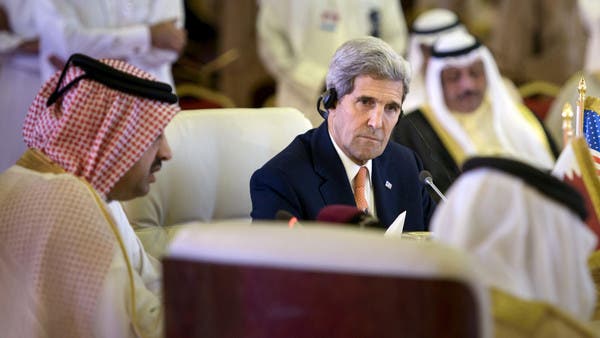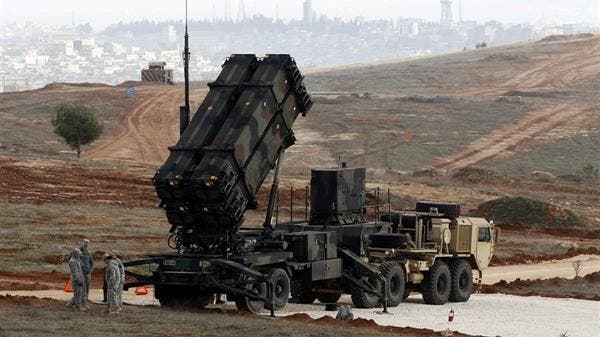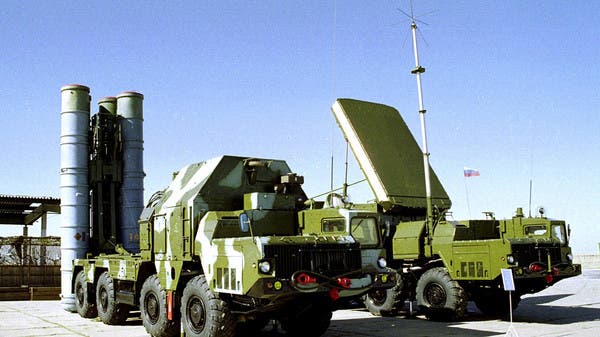BLACKEAGLE
SENIOR MEMBER
Monday's U.S.-GCC talks aimed to reassure over Iran

Kerry has been defending the deal with Iran among Gulf allies and against critics in the U.S. (Reuters)
By Ismaeel Naar | Al Arabiya News
Monday, 3 August 2015
Talks in Doha between U.S. Secretary of State John Kerry and GCC foreign ministers had more to do with U.S. commitments to ensuring regional security rather than fears of Iranian actions post the Vienna nuclear deal, political and security analysts told Al Arabiya News.
Gulf Arab states on Monday welcomed the nuclear deal negotiated between Iran and world powers, but said they required further assurances that the U.S. would help them counter increasing Iranian regional influence.
“Kerry’s visit was less to reassure the GCC about Iranian actions post-implementation, and more to reassure them that the U.S. remains committed to their security and opposed to Iranian foreign policy that, among others, conflicts with GCC interests,” Miriam Goldman, a security analyst and head of Gulf Desk at the Levantine Group told Al Arabiya News.
Speaking at a press conference after the meeting, Kerry told reporters that the Iranian deal “was not based on any expectation about what Iran will or won’t choose to do.” He also added that the criticisms focused on issues with the deal might several years before they can become realities.
But according to UAE-based geopolitical analyst Theodore Karasik, the realities were the center of Monday’s meeting that GCC leadership needed answered by Washington after the Camp David summit.
“The Camp David talks were basically to tell the GCC that they have to accept the new realities of Iran rapprochements. With today’s Doha talks, it’s much more about how to fix the new realities where U.S. can and cannot help out. By bringing out the Russians, it helps balance out the responsibilities,” Karasik said.
Arms sales
Also on agreement were the speeding of arms sales to Gulf countries after months passing since formal requests were initially made.
Kerry said the U.S. had “agreed to expedite certain arms sales that are needed and that have taken too long in the past.”
The U.S. Department of Defense recently announced the approval of Saudi Arabia’s request to buy 600 patriot missiles worth $5.4 bln.


They said that it decided to supply Saudi Arabia with 600 PAC-3 cost-reduction initiative missiles with containers, along with eight test missiles, telemetry kits, guidance-enhanced missiles, fire solution computers, launcher modification kits and other related equipment.
“The proposed sale will modernize and replenish Saudi Arabia’s current Patriot missile stockpile, which is becoming obsolete and difficult to sustain due to age and limited availability of repair parts,” said the Pentagon’s notice to Congress.
On the other end, Russia has said that it agreed to sell Iran S300 missiles defense systems once sanctions are formally lifted years from now. The Israeli Prime Minister was quick to voice his disapproval of the sale saying that “will only encourage Iranian aggression in the region and further undermine the stability of the Middle East.”
Analysts, however, say the two sales are not necessarily related to one another but warned of the politics of the sale before any future physical repercussions.
“These [sales] do not happen overnight. It takes time and they have to be set up and a lot of politics happen in these enhancements. But it’s important to think of the politics of these sales first before we worry about the realities of the weapons being possessed by the users,” Karasik said.
Goldman, the Gulf security analyst at the Levantine Group, concurred by adding that the U.S. sale had “more [to do] as a concrete expression to Saudi Arabia and the other GCC states that their security is a priority to the U.S.”
U.S.-Gulf: Special relationship
While none of Iran’s Middle East neighbors in the Middle East had a seat at the P5+1 negotiating table, they were left reassured that Iranian nuclear capabilities diminished after publicly giving their cautious approval on Monday.
“Kerry let us know that there is going to be live oversight over Iran not to gain or to get any nuclear weapons,” Qatar Foreign Minister Khalid al-Attiyah said. “This is reassuring to the region.”
Former political analyst at the Saudi Arabian embassy in the U.S. Fahad Nazer told Al Arabiya News that the Obama administration has realized a disconnect between the two countries after the Iranian deal was agreed on and that recent actions were evident in efforts of rapprochements.
“Saudi Arabia and other Gulf States have made it clear that they do not draw a distinction between the nuclear file and Iran’s current policies in the region, especially its support of the Assad regime in Syria and militant Shia groups in Iraq, Lebanon and Yemen,” Nazer said.
Nazer also added that the Iranian deal’s provisions, especially those dealing with inspections and verification, are strong enough to discourage Iran from “cheating” out of its promises.
“But should it do so anyway, the agreement has the necessary ‘snapback’ provisions that would allow sanctions to be re-imposed,” he said.
The former Saudi diplomat told Al Arabiya News that while Kerry continues to stress the U.S. shares the GCC’s concerns over Iran’s policies in the region, Monday’s talks were a final hurdle in restoring confidence through diplomacy.
“I also expect him to maintain that the nuclear deal removes a major source of uncertainty that has contributed to the turmoil in the region and that the U.S. is now willing to address the other sources of instability, starting with Syria,” Nazer said.
Last Update: Tuesday, 4 August 2015 KSA 01:04 - GMT 22:04
http://english.alarabiya.net/en/perspective/2015/08/04/Analysis-U-S-GCC-talks-on-Iran-much-more-on-fixing-new-realities-.html

Kerry has been defending the deal with Iran among Gulf allies and against critics in the U.S. (Reuters)
By Ismaeel Naar | Al Arabiya News
Monday, 3 August 2015
Talks in Doha between U.S. Secretary of State John Kerry and GCC foreign ministers had more to do with U.S. commitments to ensuring regional security rather than fears of Iranian actions post the Vienna nuclear deal, political and security analysts told Al Arabiya News.
Gulf Arab states on Monday welcomed the nuclear deal negotiated between Iran and world powers, but said they required further assurances that the U.S. would help them counter increasing Iranian regional influence.
“Kerry’s visit was less to reassure the GCC about Iranian actions post-implementation, and more to reassure them that the U.S. remains committed to their security and opposed to Iranian foreign policy that, among others, conflicts with GCC interests,” Miriam Goldman, a security analyst and head of Gulf Desk at the Levantine Group told Al Arabiya News.
Speaking at a press conference after the meeting, Kerry told reporters that the Iranian deal “was not based on any expectation about what Iran will or won’t choose to do.” He also added that the criticisms focused on issues with the deal might several years before they can become realities.
But according to UAE-based geopolitical analyst Theodore Karasik, the realities were the center of Monday’s meeting that GCC leadership needed answered by Washington after the Camp David summit.
“The Camp David talks were basically to tell the GCC that they have to accept the new realities of Iran rapprochements. With today’s Doha talks, it’s much more about how to fix the new realities where U.S. can and cannot help out. By bringing out the Russians, it helps balance out the responsibilities,” Karasik said.
Arms sales
Also on agreement were the speeding of arms sales to Gulf countries after months passing since formal requests were initially made.
Kerry said the U.S. had “agreed to expedite certain arms sales that are needed and that have taken too long in the past.”
The U.S. Department of Defense recently announced the approval of Saudi Arabia’s request to buy 600 patriot missiles worth $5.4 bln.


They said that it decided to supply Saudi Arabia with 600 PAC-3 cost-reduction initiative missiles with containers, along with eight test missiles, telemetry kits, guidance-enhanced missiles, fire solution computers, launcher modification kits and other related equipment.
“The proposed sale will modernize and replenish Saudi Arabia’s current Patriot missile stockpile, which is becoming obsolete and difficult to sustain due to age and limited availability of repair parts,” said the Pentagon’s notice to Congress.
On the other end, Russia has said that it agreed to sell Iran S300 missiles defense systems once sanctions are formally lifted years from now. The Israeli Prime Minister was quick to voice his disapproval of the sale saying that “will only encourage Iranian aggression in the region and further undermine the stability of the Middle East.”
Analysts, however, say the two sales are not necessarily related to one another but warned of the politics of the sale before any future physical repercussions.
“These [sales] do not happen overnight. It takes time and they have to be set up and a lot of politics happen in these enhancements. But it’s important to think of the politics of these sales first before we worry about the realities of the weapons being possessed by the users,” Karasik said.
Goldman, the Gulf security analyst at the Levantine Group, concurred by adding that the U.S. sale had “more [to do] as a concrete expression to Saudi Arabia and the other GCC states that their security is a priority to the U.S.”
U.S.-Gulf: Special relationship
While none of Iran’s Middle East neighbors in the Middle East had a seat at the P5+1 negotiating table, they were left reassured that Iranian nuclear capabilities diminished after publicly giving their cautious approval on Monday.
“Kerry let us know that there is going to be live oversight over Iran not to gain or to get any nuclear weapons,” Qatar Foreign Minister Khalid al-Attiyah said. “This is reassuring to the region.”
Former political analyst at the Saudi Arabian embassy in the U.S. Fahad Nazer told Al Arabiya News that the Obama administration has realized a disconnect between the two countries after the Iranian deal was agreed on and that recent actions were evident in efforts of rapprochements.
“Saudi Arabia and other Gulf States have made it clear that they do not draw a distinction between the nuclear file and Iran’s current policies in the region, especially its support of the Assad regime in Syria and militant Shia groups in Iraq, Lebanon and Yemen,” Nazer said.
Nazer also added that the Iranian deal’s provisions, especially those dealing with inspections and verification, are strong enough to discourage Iran from “cheating” out of its promises.
“But should it do so anyway, the agreement has the necessary ‘snapback’ provisions that would allow sanctions to be re-imposed,” he said.
The former Saudi diplomat told Al Arabiya News that while Kerry continues to stress the U.S. shares the GCC’s concerns over Iran’s policies in the region, Monday’s talks were a final hurdle in restoring confidence through diplomacy.
“I also expect him to maintain that the nuclear deal removes a major source of uncertainty that has contributed to the turmoil in the region and that the U.S. is now willing to address the other sources of instability, starting with Syria,” Nazer said.
Last Update: Tuesday, 4 August 2015 KSA 01:04 - GMT 22:04
http://english.alarabiya.net/en/perspective/2015/08/04/Analysis-U-S-GCC-talks-on-Iran-much-more-on-fixing-new-realities-.html
